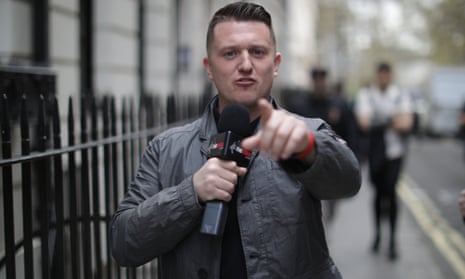The former leader of the English Defence League Tommy Robinson has been permanently banned from Twitter.
It is understood that the rightwing extremist fell foul of Twitter’s rules governing “hateful conduct”.
Twitter declined to discuss what, specifically, had precipitated the ban and Robinson, whose real name is Stephen Yaxley-Lennon, said he had been told it was for posting “Islam promotes killing people.”
The exclusion will be a blow to Robinson, who has recently sought to change his image from far-right street agitator to gonzo journalist. However, he remains active on other platforms, including Facebook and YouTube.
“Lennon was one of the main drivers of anti-Muslim sentiment in this country. He masqueraded as a journalist, an author and an expert on Islam and he is none of these things,” said Matt Collins, head researcher at the anti-fascist organisation Hope Not Hate.
“His whole reason for being [on Twitter] was to build a build a campaign of falsities against Muslims in the UK.”
Collins denied a suggestion that the ban would make Robinson stronger in his supporters’ eyes. “It is like when people said banning National Action would just make them stronger,” he said, referring to the proscribed far-right terrorist organisation.
“If people want to find and hear Tommy Robinson, they will find him. We have seen mainstream society fight back against this. Lennon was a driver of anti-Muslim sentiment and civilised society didn’t require him to be there doing it.”
Robinson told the Guardian he believed he had been banned for posting the tweet portraying the religion of Islam as inherently violent.
He said he only relates the truth and denied ever making threats or engaging in hateful conduct. Responding to one example, in which he said he would “find” the UK’s former top counter-terror police officer Mark Rowley after he had compared his online activity to the preachings of Anjem Choudary, Robinson insisted he had only meant he wanted to talk to him.
He did not address other examples presented to him, including when he told an EDL audience in 2011 that “every single Muslim” in the UK had “got away with” the 7/7 bombings and when, in January 2016, he tweeted: “I’d personally send every adult male Muslim that has come into the EU over the past 12 months back tomorrow if I could. Fake refugees.”
Twitter’s policy governing hateful conduct reads: “You may not promote violence against or directly attack or threaten other people on the basis of race, ethnicity, national origin, sexual orientation, gender, gender identity, religious affiliation, age, disability or serious disease. We also do not allow accounts whose primary purpose is inciting harm towards others on the basis of these categories.”
The social media firm adds: “Freedom of expression means little if voices are silenced because people are afraid to speak up. We do not tolerate behaviour that harasses, intimidates or uses fear to silence another person’s voice.”
The prosecution in the trial of Darren Osborne said the Finsbury Park terrorist had been an avid reader of Robinson’s social media postings as he became increasingly radicalised in the weeks prior to his van attack on a north London mosque.








